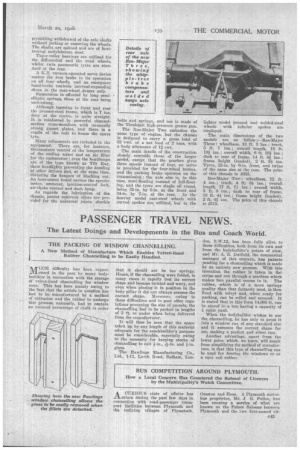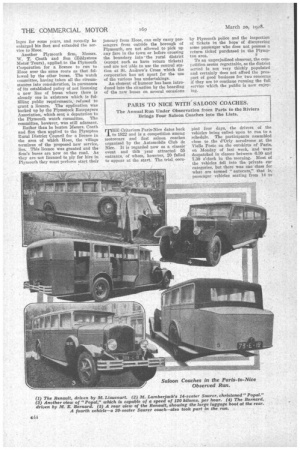BUS COMPETITION AROUND PLYMOUTH.
Page 65

Page 66

If you've noticed an error in this article please click here to report it so we can fix it.
How a Local Concern Has Countered the Refusal of Licences by the Municipality's Watch Committee.
A CURIOUS state of affairs has 11arisen during the past few days in connection with road-passenger transport facilities between Plymouth and
• the outlying villages of Plymstack,
Oreston and Hooe. A Plymouth motorbus proprietor, Mr. J G. Pullen, has been running a service of what are known as the Palace Saloons between Plymouth and the two first-named vii'
loges for some years, and recently he enlarged his fleet and extended the service to Hope.
Another Plymouth firm' Messrs. W. T. Coath and Son (Eddystone Motor Tours), applied to the Plymouth Corporation for a licence to run to How over the same route as that followed by the other buses. The watch committee, having taken all the circumstances into consideration, in pursuance of its established policy of not licensing a pew line of buses where there is already one in existence which is fulfilling public requirements, refused to grant a licence. The application was backed up by the Plymstock Ratepayers Association, which sent a deputation to the Plymouth watch committee. The committee, however, was still adamant.
Rather than be beaten Messrs. Coath and Son then applied to the Plympton Rural District Council for a licence in the area of which boa, the village terminus of the proposed new service, lies. This licence was granted and the firm's buses are now on the road. As they are not licensed to ply for hire in Plymouth they must perforce start their journey from Hooe, can only carry passengers from outside the borough of Plymouth, are not allowed to pick up any fare in the town or before crossing the boundary into -the rural district (except such as have return tickets) and are not able to use the central station at St. Andrew's Cross which the corporation has set apart for the use of the various bus undertakings.
An element of humour has been introduced into the situation by the boarding of the new buses on several occasions by Plymouth police and the inspection , of tickets in the hope of discovering some passenger who does not possess a return ticket purchased in the Plympton area.
To an unprejudiced observer, the comPetition seems regrettable, as the district served is not very thickly populated and certainly does not afford the prospect of good business for two concerns if they are to continue running the full service which the public is now enjoying.












































































































